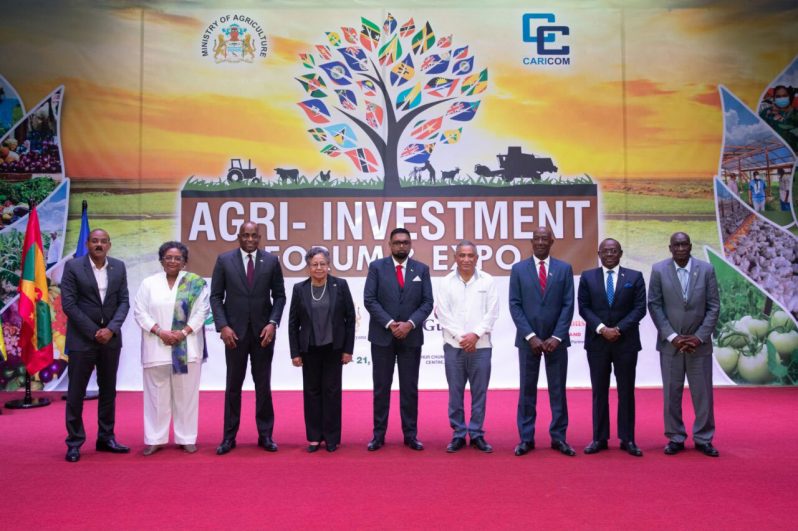Guyana leading efforts to reduce region’s food import bill by 2025
WITH the potential to build economies and cultivate socio- economic development, agriculture is one of the most lucrative sectors in the Caribbean Community (CARICOM).
The sector provides opportunities in areas such as employment, wealth creation and food and nutrition security. It also increases economic activity through primary production, import substitution, manufacturing, agro-processing, intra-regional trade, digitalisation and e-commerce.
However, the region is challenged with reducing a hefty food import bill by 25 per cent by 2025.
According to statistics provided by CARICOM, for the period 2018-2020, the region’s food import bill was US$13.76 billion, with close to US$5 billion being spent each year.
To achieve its goal, the region has undertaken various strategies, some of which target the private sector and international donor partners, with key focus being given to the areas of policy intervention, institutional strengthening, investment, and sector financing.
Leading the regional effort is Guyana’s President, Dr. Irfaan Ali, who holds responsibility for agricultural diversification and food security. He has already outlined an action-oriented and solution-based proposal, aimed at reducing the region’s food import bill by 25 per cent by 2025.
At the 33rd Inter-Sessional Meeting of the Conference of Heads of Government of CARICOM, President Ali, in his presentation, addressed each country’s report of current and target commodities to achieve the 25 per cent reduction goal, detailing both constraints and the actions that are required.
He highlighted that coffee, cocoa, coconut, spices, hemp (industrial) and palm oil are high-value imports for CARICOM with potential for development in the region.
He said that production is expected to increase between 25 per cent and 700 per cent if food imports are going to be significantly reduced by 2025. To achieve this, national expenditure on agriculture must be increased.
On average, CARICOM member states expended an estimated 2.1 per cent of national expenditure on agriculture.
However, President Ali implored that a significant increase of about five per cent expenditure in agriculture by 2025 is required for each member state.
Guyana, he said, is committed to expending 10 per cent of the national budget on agriculture by 2025.
President Ali also reported that there has been concrete progress in access to financing for agriculture investment, through a facility called the CARICOM Sustainability Agriculture Credit Facility (the “Credit Facility”), using Republic Bank Limited as a lender.
This is a special facility designed for agriculture activities including, but not limited to, development of priority crops, capital equipment for farming, feeder roads to provide access to arable lands, bulk storage for crops, processing plants and shade house farming.
This provides funding for up to five years for repayment of up to G$2 billion for Guyana and US$100 million for all CARICOM member states, with interest rates as low as 2.5 per cent.
In a recent interview with the Caribbean Media Corporation-DIME Network in Paramaribo, Suriname, on the sidelines of the 43rd Regular Meeting of the Conference of Heads of Government of CARICOM, President Ali reported that there has been significant progress in terms of achieving the 2025 target.
ADDRESSING THE CHALLENGES
He said that an overarching strategy that incorporated all the stakeholders, including farmers, the private sector, women and youth within the region was developed.
The strategy outlines specific actions that are required by each State in achieving the 25 by 2025 goal.
An integral part of the plan is transportation and logistics.
According to President Ali, at the CARICOM meeting, great strides were made in developing the architecture to bring the transportation plan into action.
There was also a commitment to advance the work to secure financing to operationalise the plans as quickly as possible.
Another important aspect is removing the barriers within the region itself. The Guyanese Head of State said, “There is a clear commitment from all the leaders that the time for discussing and talking about these barriers is over, and we are now working on a strategic time – bound approach, and the removal of these barriers.”
Additionally, several agriculture fora where policy makers and stakeholders interacted were held.
The first forum, the inaugural Agri-Investment Forum and Expo was held in May of this year at the Arthur Chung Conference Centre (ACCC), followed by the Agrofest at the Queen’s Park in Barbados and the second Agri Investment Forum and Expo in Trinidad and Tobago.













